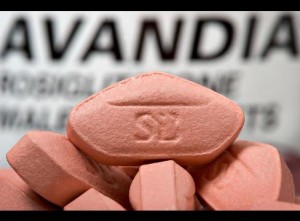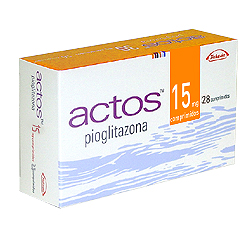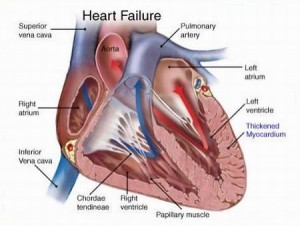INTRODUCTION: Avandia is a drug that’s been used for over a decade to lower blood sugars in people with diabetes. The reason that made Avandia important is that, in diabetics, blood sugars levels can go dangerously high. They can hurt your heart, your kidneys, your eyes, every part of you. High blood sugars can kill you. And if you think this won’t ever happen to you, are you overweight? Do you wish you had more energy? Do you need to urinate a lot — especially after eating something sweet? How about high blood pressure? Those all can be symptoms of diabetes. And if a checkup reveals that your blood sugars are high, you might need to bring them down–with daily insulin shots. Or exercise. You could change your diet. Or, how about taking a little pill? Such as Avandia?
In 1999, the FDA approved this blood sugar lowering drug. It has earned billions of dollars for its maker, Glaxo Smith Klein.
Fast forward to 2010. This summer, the FDA nearly banned Avandia, due to growing safety concerns. Critics charge that during the last decade, Avandia caused 100,000 more heart attacks and deaths than the U-S would have experienced if Avandia had never been for sale. Over 10,000 people have sued Glaxo charging that the big pharma company raked in profits while hid the dangers their drug, and hurting the people who swallowed it. Sales of Avandia have slowed to a trickle. Sales of a different sugar-lowering drug, Actos, have surged ahead.
Is Actos safer than Avandia? Up next, we’ll hear some strong opinions on that topic — and more, by talking with Dr. Ron Rosedale. Dr. Rosedale is an expert on reversing diabetes and other diseases of aging. He recommends using a dietary approach to heal heart disease, arthritis and diabetes and more. Dr. Rosedale is not a fan of Avandia. For over ten years, he’s been warning people about its health risks.
RON ROSEDALE: It’s old news. The only new news is that they’re looking at it again, and that it took so long The real story is why is it on the market, and why did it get on the market to begin with? And it goes much deeper than that, into the workings of the entire medical system. The fact is there has not ever been a diabetic drug that doesn’t cause such significant side effects than it might be worse than the benefit of lowering the blood sugar. Metformin might be an exception. But every other drug, the sulfonylureas, the Troglitazone drug class that Avandia and Actos are in, the newer DDP-4 class, such as Januvia, the fact is, they probably cause more harm than they help.
Ron Rosedale says he figured out that Avandia was dangerous by studying how Avandia interacts with our body’s cells–and especially a special protein that carries instructions from our DNA. This protein is called PPAR-gamma, and drugs such as Avandia work by forcing our cells to get a louder dose of instructions that come from PPAR-gamma. Ron Rosedale says it’s predictable that forcing a cell to take on more PPAR-gamma orders than it’s really able to handle can hurt the cell . . . . and also, hurt us. He says the proof lies in what’s happened with this whole class of blood sugar lowering drugs, which are called – get ready for this, the Troglitazones.
RON ROSEDALE: With the Troglitazones such as Avandia, if you actually just go into their mechanism of action, you could predict that they will kill people. There was a drug that was withdrawn from the Market called Rezulin, prior to Avandia being approved.. Rezulin was the first of this class of diabetic medications that was on the market in 1997 and then later was taken off the market because it killed people. The so-called PPAR gama agonists. they stimulate a certain receptor on the nucleus of cells called PPAR Gama which is involved in fat metabolism.
Before it was even approved for market, I read up on PPAR gamma to see what it was. At the time, it was a newly discovered receptor, a newly discovered part of our metabolism that certainly doctors had never heard of, and most researchers had just started doing experiments with.
Their experiments were showing that Avandia and similar drugs could push a body’s cells to take in more sugar, which did reduce blood sugars. Because of this ability, Avanida became known as an insulin sensitizer. So was it? Is it? Ron Rosedale:
RON ROSEDALE: Well, Not really. Not really.
Many other experts call Avandia an insulin sensitizer, including many scientists, the Journal of the American Medical Association, and the maker of Avandia — Glaxo-Smith Klein. Ron Rosedale remains stubborn:
RON ROSEDALE: That’s how it reads and that’s how the drug companies presented it to the community. You have to understand, and people have to understand that drug companies are there to make money. They’ll spin the information. They’ll hire statisticians, PR departments. The vast majority of money the drug companies spend has not to do with research but with very elaborate ways of marketing.
In case you’re wondering whether the words “insulin sensitizer” really even matter, imagine you’re a doctor, treating someone whose blood sugars are way too high. Let’s make the doctor’s patient an insulin-resistant diabetic. After all, most diabetics produce plenty of insulin. That’s a hormone that is so powerful, usually, just a little insulin, easily get cells in our bodies to take in excess blood sugar . . . IF those cells are insulin sensitive. But, most diabetics are insulin resistant, which means their cells don’t hear the message to take in more sugar. So an insulin-resistant diabetic often has high insulin levels AND high blood sugars.
If you’re a doctor with an insulin resistant patient, wouldn’t you want their cells to be more insulin sensitive? Wouldn’t you think that an insulin sensitizer might do the trick? That’s a big reason why thousands of doctors prescribed Avandia . . . without realizing that in many cases, this so-called insulin sensitizer was doing more harm than good.
So, why did so many patients allow themselves to take so much Avandia, even though, today, we know this drug was causing many of them harm? Looking back, it’s likely that their doctors told them that the drug would help them. And for another thing, if you’re an insulin resistant diabetic–and most diabetics are–then you’re likely to be overweight — even obese. You probably feel drained of energy. You may have a round belly and high blood pressure. And because you’ve been told those conditions involve being insulin resistant, then wouldn’t you like to be more insulin sensitive? And if you take a little pill that’s advertised as an insulin sensitizer, and you’re told it lowers the high blood sugars that cause so many problems . . . wouldn’t you expect that maybe that insulin sensitizer would also make it easier to lose the extra weight. It’d be easier to have more energy.
The 2010 Congressional hearings have highlighted how much Avandia has NOT lived up to these expectations. In reality, taking Avandia may have killed more people than it’s helped. As for hopes of weight loss, people who take Avanida are more likely to gain weight. And not only do they often feel more tired . . . in scientifically measurable ways, their body’s cells are more tired. Their muscles may not work as well. Their hearts might not pump as well. So, how did so many doctors, and patients, overlook these potential problems with Avandia? Dr Rosedale:
RON ROSEDALE: People are very good at following, and that’s what the drug companies taught the doctors, and that’s what the doctors taught the patients. It took me literally no more than five minutes back in 1996 to discover what the PPAR agonists do, like first Rezulin, then Avandia and Actos.
Ron Rosedale does not call these insulin sensitizers because they don’t give cells the room to be more insulin sensitive on their own. For Dr. Rosedale, helping a cell be more insulin sensitive means reating the right conditions so that insulin levels in the body can naturally go down to just a tiny bit of insulin, while the cells become so sensitive to hearing insulin’s instructions that that tiny bit of insulin guides them to take sugar out of the blood and use it for things like making energy. With the kind of insulin sensitivity that Dr. Rosedale recommends, excess fat does tend to melt away. People generally do have more energy. Their blood pressure often goes down naturally. For Dr. Rosedale, a health change isn’t an insulin sensitizer unless it achieves all these things. His issue with drugs such as Rezulin and Avandia and Actos is that they strong-arm a cell into taking in more sugar. Dr. Rosedale says these drugs don’t make a cell more sensitive to insulin, and to taking in sugar. They bludgeon cells into doing these things.
RON ROSEDALE: And I spoke out against Rezulin before it ever came on the market. And then it was withdrawn for safety reasons. But they all work the same way. Rezulin is the most powerful of the three. It works has nothing to do with resensitizeing the cells to insulin. It does one thing only. It causes cells to turn into fat cells. it makes more fat cells.
Perhaps you’ve never thought of Avandia as a way to make a heart cell become less able to pump your blood — because it’s being forced to become more of a fat cell than a heart muscle cell. Ron Rosedale says that Avandia can do this to any muscle cell. It can make it take on more fat than it’s really designed by Nature to handle. it can make liver cells store more fat than they’re designed to take. As to your body’s fat cells–Avandia can make them fatter. And that’s ironic. You see, many doctors and health agencies blame diseases such as diabetes on people “letting themselves” get overweight. So, why, for so many years, did so many of these health experts recommend a pill that would increase the chance of people getting fat? Well, actually, what these former fans of Avandia might not have known is that the drug was basically putting into hyperdrive a natural sort of emergency choice that the body uses, on its own, for protecting itself from high blood sugars. That protective action is called getting fat. Here’s Ron Rosedale:
RON ROSEDALE: It helps to understand a little more background about diabetes. You can consider most people obesity to be the price one pays to keep people from becoming a diabetic. As long as you can make fat out of the sugar, it keeps the sugar levels low. If you simply define diabetes by blood sugar levels going high, which is how it’s done today by most doctors, then getting fat becomes a healthy event because it prevents our blood sugar from going too high.
Ron Rosedale says that cells in our bodies can take on excess sugar for a little while. But they have other jobs, and our lives depend on them doing those jobs. So over time, those cells start to resist the signal from insulin to take in even more sugar. Dr. Rosedale says that muscle cells and liver cells tend to get insulin resistant first. Over time, even fat cells will start to resist the taking excess sugar in.
RON ROSEDALE: When fat cells get resistant to insulin, they can no longer make more fat out of the sugar, then blood sugars do start to go up, and that’s when someone is diagnosed as a diabetic. That’s when it gets diagnosed, but in reality, the diabetes diagnosis was preceded the onset of the actual diagnosis of high blood sugar by decades.
Ron Rosedale says that before a baby is even born, it can be affected by high blood sugars.
RON ROSEDALE: When you’re a fetus, you can start developing insulin resistance, which is really a disease, so if a mother eats a diet that largely turns into sugar, the fetus becomes insulin resistant.
While becoming insulin resistant does protect the inside of our cells from being as damaged by excess sugar, Dr. Rosedale says it also leads our bodies to become increasingly confused. For instance, our livers have the natural ability to send out instructions to make sugar from our own body — by harvesting protein from our muscles and our bones then turning that protein into sugar. This allows our bodies to make more sugar even when we aren’t eating foods that turn into sugar . . . . but if a body’s insulin resistant, and blood sugars are already high, the liver can be so confused, it sometimes keeps making sugar. It gets stuck in overdrive, dissolving muscles and bones to make MORE sugar, and in this way, making blood sugars even higher.
RON ROSEDALE: As the liver becomes more insulin resistant, then insulin cannot do its job which is to put the breaks on the liver manufacture more sugar, So the pancreas produces more insulin when the liver becomes resistant, there’s a disconnect. Your liver can’t hear it and it starts making too much sugar. That happens in almost all diabetics. The liver produces too much sugar. The muscles can burn some of that extra sugar. So you’re still not being diagnosed as a diabetic because you’re burning off the excess sugar. This is a kind of simplification. Leptin regulates the ability of the body to do many things. As does insulin.
As your muscles become more insulin resistant, they can no longer burn the sugar, and they go to your fat cells. And you become fatter, you still have a garbage can to put the excess sugar. As your fat cells increase, you become 10, 20 100 pounds overweight, your fat cells will start to be insulin resistant, and the sugars will build up in your blood.
You actually became a diabetic when you were a fetus, but now you’re being diagnosed as a diabetic, and now you have nothing you can do with it. And it starts accumulating and you’re diagnosed as a diabetic. So they put you on Avandia. Avandia stimulates PPAR receptors on cells. It’s a chemical that was artificially manufactured to do that, period. What PPAR gamma does is make fat cells. So it doesn’t improve the receptors on cells that have anything to do with insulin. it is not an insulin sensitizor– that has been a big fat lie, one of many that has been perpetrated by drug companies in their marketing efforts, and doctors believe this . . .. stuff.
Now, despite all these explanations, it may still be hard to swallow that a little pill that’s supposed to help people’s health can turn something as important as a heart cell into a fat storage cell. But Ron Rosedale holds firm that this is what Avandia does.
RON ROSEDALE: It causes them to turn into fat. it causes liver cells to turn into fat cells. It causes bone cells to turn into fat cells. Those classes of drugs can multiply your risk of bone fracture. it smothers your heart with fat and can turn your muscle cells into fat which can cause heart failure it turns liver cells into fat cells. there’s a lot of adverse effects. that’s the last thing you want as a diabetic. The vast majority, because the underling disease is a metabolic disorder, not the least of which is the inability to properly burn fat. The last thing they need is to become more obese. The last thing they need is further dis-regulation in their fat metabolism, which is what Rezulin, and Avandia and Actos do.
Here’s more from Ron Rosedale about why it’s not beneficial to force the highly specialized cells in your body to take on the additional function of storing excess amounts of fat — which he says drugs such as Rezulin and Avandia and Actos make them do:
RON ROSEDALE: They have trouble performing their job because heart cells stop performing like heart cells and they start performing like fat cells. Bone cells stop performing like bone cells. There’s a disorganization of the orchestration of division of labor in the body. And it goes even further.
Up next, Ron Rosedale is going to talk about another problem with PPAR agonists such as Rezulin, Avandia and Actos. That problem is that, in addition to pushing the body to store more sugar as fat, these drugs also reduce a body’s ability to burn the fat for energy. Picture a vault full of gold bars that’s bursting at the seams, and contraption is still adding more gold to it. Meanwhile, picture a desperate family that really needs some money to spend, but the vault is locked up tight. Well, that’s similar to what happens in the body when the levels of instruction proteins, such as insulin and PPAR agonists go too high: They push the body to store sugars as fat, and they lock up the ability to burn that stored fat as energy. Ron Rosedale:
RON ROSEDALE: There are studies from many years ago that shows the rate of aging in laboratory animals can be determined by the proportion of activity between PPAR gamma and alpha. Alpha initiates the ability to burn fat. Your body can burn sugar or fat and byproducts of fat called ketones. Health is determined by which fuel you burn. They more fat you burn the healthier you’ll be. the rates of aging studies have concincingly shown that as you burn fat as your primary energy source, your rate of aging, and the symptoms of aging, will go down. Avandia and Actos and Rezulin before them go exactly the opposite, and so it should be zero surprise that these actually increase the rate of death, which is what these studies are finding.
At this point, perhaps you’re thinking that drugs such as Avandia can be a bad idea. Or, maybe you’re thinking that the mistakes made by our body’s cells are where the problem lies. After all, if our cells would just take in blood sugars and burn them as energy in the first place, they wouldn’t end up being insulin resistant. So, you might wonder, why are our bodies’ cells so stupid that they start to resist the signals sent by insulin? Ron Rosedale:
RON ROSEDALE: LAUGHTER Well, actually, they’re probably not being stupid. They’re probably protecting themselves. They know that if there’s too much sugar inside the cells, it’ll cause damage within the cells.
You see, that’s the problem. Yes, it hurts cells to have too much sugar touching their outer surfaces, burning and gumming them up what is basically, their “skin”. But if high sugar levels can do this outside of a cell, think of how much more damage excess sugar could do if it was forced inside a cell, where everything is even more delicate. Just what kind of damage can a little bit of sugar do? Dr. Rosedale says sugar molecules really can gum things up – in a process known as glycation.
RON ROSEDALE: Glycation enables sugar molecules to attach to other molecules such as proteins and DNA. Proteins exist in a certain shape and it’s the shape that determines its information. When sugars glycate a protein, they change its shape which prevents them from delivering the information they’re supposed to. Glycation is one of the major damages that occurs in the body and this ultimately will accumulate and accrues and cause your death.
It’s well known in research but not as much in medical practice. When cells glycate, when molecules glycate, they can form advanced glycated end products, and the acronym for that is ages, and they know it’s a measure player in the damages and rate of aging. Therefore, having elevated blood sugars is not healthy. But how you lower the blood sugars is very important. We don’t want to substitute a worse evil than the elevated blood sugar. If you’re lowering sugar by raising insulin, then you’re mimicking the conditions that cause diabetes in the first place. When cells become insulin resistant, they’re not being stupid. Cells become very smart because they let less sugar in.
That’s worth repeating. The insides of cells are very delicate. Yes, they need some sugar. But not too much. Look at it this way. If you want a little bit of honey in your kitchen, maybe you store a little in a jar, so you can use it when you choose to use it. Now think of what would happen if someone came to your front door with a fire hose and started blasting your kitchen full of honey. Wouldn’t you want to protect yourself from getting way too much that way? Wouldn’t you want to resist this strong-arming . . . this, basically, this assault? Dr. Rosedale says it’s somewhat similar in cells. Although, if you shut your front door and keep out the blast of honey . . . well, it would still cause problems. Dr. Rosedale:
RON ROSEDALE: By cells becoming insulin resistant, it keeps excess sugar out of those cells. But the excess sugar outside the cells can cause problems to molecules external to the cells. Thus kidney tubules becoming damaged, nerves becoming damaged.
Ron Rosedale says a deeper, more fundamental problem with being diabetic is confused instructions multiplying throughout the body. And most of those confused instructions can’t be solved by taking a pill.
RON ROSEDALE: The major problem in most diabetics, certainly Type 2 diabetics, is secondary to a hormonal regulation. When a person becomes insulin resistant, it’s not a disease of blood sugar at all, it’s a disease of insulin signaling. It produces too strong a signal in some cells, and that’s what causes the death and major problems, And any drug has nothing to do with that. it doesn’t treat the underlying cause of the disease.
Ron Rosedale adds that it’s impossible to really improve the body’s signaling instructions simply by adding more of the signaling instructions. For instance, adding more insulin will generally just lead to greater insulin resistance . . . . meaning it takes more insulin to do what used to just take a little bit of insulin. And all that extra signaling creates another problem.
RON ROSEDALE: well it’s too noisy. If I were to start screaming into the microphone here, not a whole lot of listeners would consider listening. It’s how loud it’s being spoken, and if it’s being spoken too loud, your cells lose their hearing, just like you would, or I would. You burn out, at least, temporarily. the best way to treat it is to reduce the smell, not to increase it. All you’re going to do is to perpetrate the cause of the disease in the first place.
He says that Rezulin, Avandia and Actos are one style of medication that doesn’t solve the underlying problems of diabetes and actually can make health worse. Dr. Rosedale warns of problems with other diabetes drugs, such as Glipizide and Glimepriride, which are Sulfonylureas that push the pancreas to produce more insulin in a region of the pancreas known as the islet cells. Some people have incredibly strong islet cells. While a normal person who’s insulin sensitive may have islet cells that produce say, 15 units of insulin a day to keep their blood sugars normal, a person with a very strong pancreas, who’s insulin resistant, might be producing 1,000 units of insulin a day to keep their blood sugars at the same, “normal” level. That incredibly high insulin level might be increasing the likelihood that person is overweight, or has high blood pressure, or heart disease, or cancer, or arthritis. High insulin levels have been linked to all of these. But, at least, their blood sugars will be normal, so they won’t be called a diabetic. A person only gets called a diabetic by the medical community if their pancreas is so stressed, islet cells have been burning out. They’ve been pushed so hard to make more insulin that they’ve been dying. Then, blood sugars do start going up. So, what happens Dr. Rosedale asks, when you give someone with a worn-out pancreas a drug that makes the pancreas work even harder? He says they take an insulin resistant diabetic –called a Type II diabetic, and kill off enough of their pancreas that their bodies’ really can’t produce enough insulin period — a condition known as Type 1 diabetes.
RON ROSEDALE: The Sulfonylureas cause the islet cells to make more insulin. They took drugs that basically whipped a horse at the end of a race. They whipped the islet cells to make more insulin and once the islet cells died, they needed more insulin. They basically converted Type 2 diabetics into type 1 diabetics, and it’s due to how diabetes is being treated. it’s an iatrogenic disease.
What I would call malpractice.
Speaking of malpractice, right now, over ten thousand patients are suing the makers of Avandia, Glaxo Smith-Klein. These patients accuse Glaxo of fooling them into taking a dangerous drug. Ron Rosedale has this to say about the lawsuit:
RON ROSEDALE: The basis of the suit is not going to be that they took a drug that caused harm. You could do that with virtually any drug. what’s more alarming is the drug company got caught trying to cover up adverse side effects. I could go after drug after drug, whereas if you just looked at the science behind them, you could have predicted the adverse side effect. Before the drug was ever approved, in 1999, they hid evidence that the drug Avandia causes heart disease.
Dr. Rosedale says the increase of heart disease was predictable because of how PPAR agonists such as Avandia stimulate any cell to take on more tasks of storing fat . . . including heart cells. And he says that fat storage focus of drugs such as Avandia . . . and Rezulin . . . also made it predictable that these drugs would cause people to become more overweight.
RON ROSEDALE: What I did . . . in the time of Rezulin, before it came on the market, so 1995, I calculated how much fat would have to be manufactured in order to lower the blood sugar. If you took that amount, and you multiplied it by the number if liters in the body and the number of days, how much fat would be formed, and I calculated it would be 5 pounds, and that would account for the blood lowering effects of these drugs. I asked the drug rep, because at that time I was praciticing conventional medicine and the drug reps were there every single day, when I was done seeing patients, to push drugs on me. So I asked the drug rep, do these drugs cause weight gain, because theoretically by the way they work, they would have to, and she said, yes, about 5 pounds a year.
RON ROSEDALE: Ron Rosedale goes on to say that if he predicted these problems about drugs such as Avandia, over a decade ago, why didn’t the FDA regulators? Why did we have to wait until 2010 to have such strong warnings about Avandia? And why not go further? Why not ban it?
RON ROSEDALE: They should never have been on the market. There was a lot of evidence about its faults and its danger before it was ever accepted for distribution in 1999. And Dr. Buse, I think, was threatened with a huge lawsuit. the University of North Carolina was also threatened with a huge lawsuit that they could ill afford, and so they had to keep their mouths shut.
In terms of simple math, Ron Rosedale says you can accomplish the same benefits of taking Avandia, with fewer side effects, with a very simple dietary change:
RON ROSEDALE: A person could eat one slice of bread less a day, and have a greater effect on blood sugar than every drug on the market. If they stopped eating foods that are well known to turn into glucose, the diabetes can be reversed. It’s an easy disease to reverse, without the use of drugs. The drugs cause more harm than good. They make my job harder, rather than easier. I hate to say it, and it sounds like I’m way out in left field. But if you look at the science behind them, that is the case. Those people will have to take injections of insulin, if it can’t be reversed quickly. Type II strictly by not eating foods that turn into sugar.
Ron Rosedale’s recommendation that people who are prone to diabetes NOT eat foods that turn into sugar goes against the grain of many well-respected health organizations. The American Diabetes Association websites and the USDA food pyramid guidelines both recommend that the majority of calories in the American diet should come from sugars and starches such as bread, pasta, potatoes, cereal.
RON ROSEDALE: And they’ve done a great job, and they’ve been extremely effective at reducing the number of diabetics, over the years, in this country. The number of diabetics is accelerating and becoming far worse as people are adhering to the guideline of the American Diabetes Association.
Not only are more people becoming diabetic today . . . more people are getting diagnosed at much younger ages. Because of this, Ron Rosedale predicts that for the first time in our history, average lifespan may start going down.
RON ROSEDALE: Children now are starting to behave as adults as far as disease is concerned. So many children now are getting so called adult onset diabetes. The insulin resistance that used to take decades to accrue is now occurring in a few years.
With all these problems happening through standard health recommendations and the use of drugs such as Avandia, Ron Rosedale says that it’s time to change:
RON ROSEDALE: If we were a stupid mouse in a maze, and we’re trying to reach a goal which in this case, would be health, if you hit a wall, you at least go a different way. what we’ve been doing isn’t right. That is virtually proven, that people are getting worse. The rate of diabetes is going up. the rate of cancer certainly isn’t going down. If we’re not doing something right, then we must do something different.
The key thing Ron Rosedale says to do differently is to eat differently.
RON ROSEDALE: What you eat is going to determine your health more than anything else you’re going to do. Well let’s eat something else let’s do something different.
But we all know that it’s challenging for people to change what they eat. So, why even try? Ron Rosedale.
RON ROSEDALE: Hmm. Well, because it might not be a simple thing to do, it doesn’t mean we can’t start making some changes so it will be more simple in the future. You could say the same thing about cigarette smoke. It’s not easy to quit smoking cigarettes. Cigarettes. the incidence of cigarette smoking has gone down, as long as the government stood behind us.
Ron Rosedale warns that many groups have a vested interest in making money from rate of diabetes going up. But as a nation, he says we can’t afford to let that happen.
RON ROSEDALE: Yes. It has to be done, and it has to be recognized that the forces that wish to prevent this are not concerned about the health of people. They are afraid of their profits being lost. billions, even trillions of dollars that are being spent on health care and wish it to stay the same, and they’ll make bogus studies, they’ll do whatever they can. They’ll cover up information, they’ll publish wrong information, and they’ll spend lots of money on public relations and advertising. I’m really happy that Some of this is being exposed, it’s the tiny tip of an iceberg, what’s going on with the Congressional Hearings that have to do with Avandia.
It has essentially dominated medical care for the last few decades. The real problem is that real science is not being looked at. the science is plain to see by anybody that has an open mind to science. For a true scientist, the evidence is simple and clear, and the only thing clouding the picture are special interest groups that wish it to be hidden.
Now, so far, we’ve focused on Avandia as the drug that’s under fire for causing more harm to people’s health than benefit–especially to their hearts. You see, a close analysis of the research studies involving Avandia have shown the it can increase the risk of heart attack and stroke.
Meanwhile, in this year when Avandia’s been under so much pressure, the makers of Actos have been running full page ads in newspapers, with headlines such as this: “Actos has been shown to lower blood sugar without increasing your risk of having a heart attack or stroke.” Ron Rosedale says the key words to remember in this statement are “has been shown”
RON ROSEDALE: It doesn’t mean it doesn’t do it. It means the company wasn’t so audacious as to try and show its benefit, which might otherwise have revealed its detriment. to show the 60% increase in risk of cardiac deaths. That’s huge. But it wouldn’t show with a single study. What they’ve done with Actos is just not do studies.
Dr. Rosedale says his look at the biological workings of Actos makes him view it in the same way that he does Avandia.
RON ROSEDALE: Metabolically, it’s virtually identical. it is there specifically to stimulate PPR receptors, it’s in the same class of medication, it will do exactly the same thing, and over time as more data is gathered and looked at in an objective manner, that will come out, too.
And that means all the problems with Avandia, including cells being forced to take on more fat. He adds that you really could get the same benefits by throwing away these pills and eating one less slice of bread. And if a person wants to get even healthier, Ron Rosedale says eat even fewer foods that turn into sugar.
RON ROSEDALE: Anybody can eat one slice of bread less a day. If they want to have the benefit that they have on the drug, that’s all they have to do. if they want to get rid of their diabetes, that would require a little more modification. But when they do that, it modifies additions and desires and hunger. You greatly improve the ability of leptin to work properly. Leptin regulates the ability to sense sweetness. Virtually everything changes for the better. You’re allowed to burn fat. You store less of it. You’re not hungry. Your desires and cravings to eat, and especially to eat carbohydrates and that little bit of time can be just a few weeks. All they have to do is make the attempt. Even if they do it partially, they’ll still affect their body in a much more positive way than the medications would ever dream of doing.
Dr. Rosedale suspects that the current headlines about Avandia are not simply motivated by protecting consumer health. He says they might be part of a carefully orchestrated marketing campaign that will clear the way for a new class of diabetes medications that will be sold in greater numbers very soon. He suspects that big pharma agreed to the grilling regarding Avandia because of their future plans.
RON ROSEDALE: It’s actually being allowed by the forces that be and the committees are on the payroll of the pharmaceutical industry. Another drug, probably in the DPP4 antagonist class that can take its place, and I think that’s what’s happening, absolutely. The DPP4, there’s like four or five of them now, Januvia was the first one. They’re taking over now, and then it’ll take another ten years, or even longer, because the downside of them is that they will cause cancer. DPP4 most of which have to do with inhibiting cancer. It’s one of the major ways that your body identifies cancer cells. You’re lowering your body’s ability to recognize cancer. The drug companies are going ahead anyway, because the hardest disease to pin on something is cancer, and it’ll take five, ten years for people to start dying of cancer and another five to ten years of uncovering the truth. Well, it can be a long time.
Rather than wait a long time to find out what the side effects, and harms, of the next group of diabetes drugs will be, Ron Rosedale says just change how you eat. You can find his suggestions at his website: drrosedale.com. Or, at the very least, he says, beware taking drugs like Avanida.
RON ROSEDALE: My biggest beef with all this is if they did nothing, they probably would be healthier, with the higher blood sugar. I think the drugs are worse than their benefit in lowering the sugar.
I’m Shelley Schlender. Our guest has been Ron Rosedale. Dr. Rosedale is not a fan of the diabetes drug, Avandia. For over ten years, he’s been warning people about its health risks. He recommends using a dietary approach to reverse problems such as heart disease, arthritis and diabetes. You can find out more from his book, The Rosedale Diet. Or check his website: drrosedale.com.


















I think one important consideration about Avandia is that it represents what an adverse outcome is, so that when people have “concerns” about low carbohydrate diets, this is what they should be looking for but after 40 years, nobody has identified anything like this. So it’s hard to say that a diet or drug is safe without asking what would be unsafe so Avandia is a good standard to compare low-carb diets.